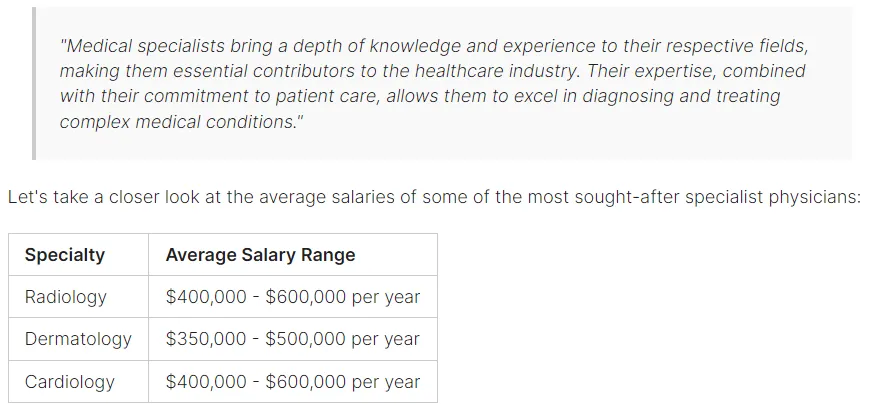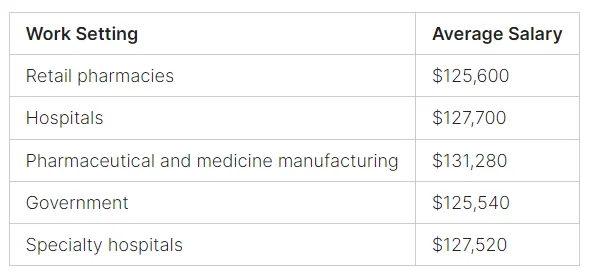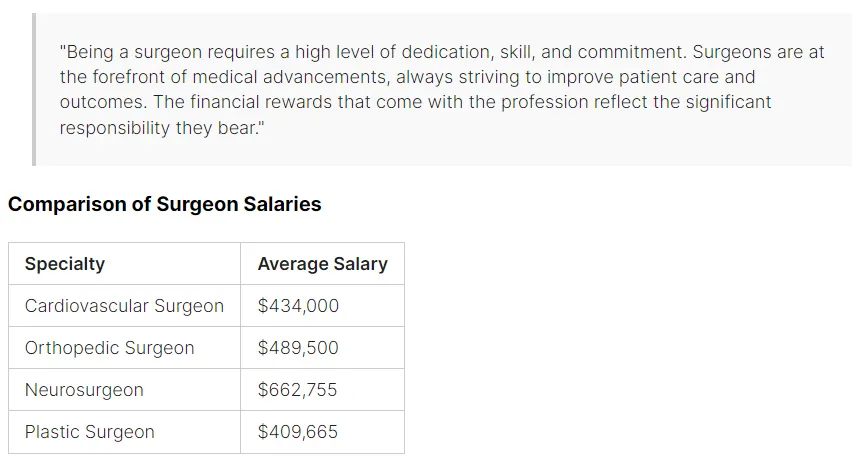Senior-Level Anesthesiologist Salary: Understanding Compensation at the Pinnacle of the Field

Author: Tyesia Hunter
As an anesthesiologist, you play a crucial role in ensuring patient comfort and safety during surgery. Your expertise in administering anesthesia, monitoring patients, and managing pain is indispensable. But what about your compensation? Let's explore the salary landscape for senior-level anesthesiologists, so you can gain a better understanding of what to expect at the pinnacle of your profession.
Key Takeaways:
- Senior-level anesthesiologists typically earn high six-figure salaries.
- Surgeons, medical specialists, dentists, and pharmacists are also high-earning healthcare professions.
- Anesthesiologists require extensive medical training to excel in their field.
- Specialist physicians can earn substantial incomes, ranging from mid-six figures to seven figures.
- Oral and maxillofacial surgeons, with their specialized surgical skills, can command high six-figure salaries.
Anesthesiologist

Anesthesiologists play a crucial role in ensuring patient comfort and safety during surgery. They administer anesthesia, monitor patients, and manage pain. To become an anesthesiologist, extensive medical training is required. Anesthesiologists typically earn high six-figure salaries.
With their specialized skills and expertise, anesthesiologists command significant compensation in the healthcare industry. The average salary for an anesthesiologist in the United States ranges from $300,000 to $400,000 per year, with the potential to exceed these figures based on experience, geographical location, and the type of facility they work in.
Key Role in Surgical Procedures
Anesthesiologists provide critical support during surgical procedures. They carefully administer anesthesia medications and closely monitor patients throughout the operation to ensure their safety and comfort. By managing pain and adjusting anesthesia levels as needed, anesthesiologists help patients undergo procedures with minimal discomfort and reduced risks.
Furthermore, anesthesiologists play a key role in the preoperative and postoperative care of patients. They assess patients' medical histories and conditions to develop personalized anesthetic plans, collaborating closely with surgeons and other healthcare professionals to optimize patient outcomes.
Extensive Training and Education
To become an anesthesiologist, aspiring medical professionals must complete a comprehensive educational journey. After obtaining a bachelor's degree, individuals must attend medical school for four years to obtain a Doctor of Medicine (M.D.) or Doctor of Osteopathic Medicine (D.O.) degree.
Following medical school, aspiring anesthesiologists must complete a residency program in anesthesiology, which typically lasts four years. During this training, they acquire the skills and knowledge necessary to safely administer anesthesia and manage patients' pain and vital signs in various surgical settings. Some anesthesiologists may choose to pursue further sub-specializations through additional fellowships.
Salary Outlook and Growth Potential
As mentioned earlier, anesthesiologists earn high six-figure salaries on average. However, compensation can vary depending on several factors such as years of experience, geographic location, and the demand for anesthesiology services in a particular region.
In addition to their base salaries, anesthesiologists may also enjoy additional benefits such as healthcare coverage, retirement plans, and malpractice insurance. These comprehensive compensation packages contribute to the overall attractiveness of a career as an anesthesiologist.
Related: Tips for Negotiating Anesthesiologist Salary
Anesthesiologist Assistant

Anesthesiologist assistants play a critical role in providing anesthesia care. They work alongside anesthesiologists to ensure the safe and effective administration of anesthesia during surgical procedures. With their specialized knowledge and skills, anesthesiologist assistants contribute to patient comfort and well-being throughout the surgical process.
Salary Range
The salary of an anesthesiologist assistant can vary depending on several factors. These may include:
- Years of experience
- Location of practice
- Practice setting (hospital, clinic, or private practice)
- Additional certifications or specialized training
The average salary for an anesthesiologist assistant is approximately $150,000 per year. However, the salary range can extend from around $100,000 on the lower end to as high as $200,000 or more annually on the upper end.
It’s important to note that factors such as geographic location and demand for anesthesiologist assistants can significantly impact salary levels. Anesthesiologist assistants in areas with higher costs of living or a greater need for their services may command higher salaries.
Industry Outlook
The demand for anesthesiologist assistants is expected to grow in the coming years. As the healthcare industry continues to evolve, anesthesiologist assistants are becoming increasingly recognized for their valuable contributions to patient care. The Bureau of Labor Statistics projects a 21% growth in employment for physician assistants, which includes anesthesiologist assistants, through 2028.
This positive industry outlook, combined with the specialized skill set of anesthesiologist assistants, offers promising opportunities for career growth and financial stability.
By investing in continued education, pursuing additional certifications, and gaining experience in different practice settings, anesthesiologist assistants can position themselves for greater earning potential and advancement opportunities within their field.
Surgeon

Surgeons are highly skilled medical professionals who perform intricate and life-saving surgeries, specializing in areas like cardiovascular and orthopedic surgery. Their expertise and precision are crucial in ensuring positive patient outcomes and improving quality of life. With their significant responsibilities and the complexity of their work, surgeons can command impressive salaries.
According to industry reports, the average salary for surgeons ranges from the high six figures to seven figures annually. This level of earning potential reflects the extensive education and training required to become a surgeon. Surgeons undergo rigorous academic programs, followed by years of residency and practical experience. Their expertise, experience, and specialization contribute to their high earning potential.
Surgeons play a pivotal role in the healthcare system, and their contributions often have a direct impact on patients' lives. The demanding nature of their work, long hours, and stress levels are balanced by the rewarding financial compensation they receive.
Factors Influencing Surgeon Salaries
Several factors can influence a surgeon's salary. These factors include:
- Years of experience: Surgeons with more experience generally command higher salaries as they demonstrate a track record of successful surgeries and patient outcomes.
- Specialization: Surgeons who specialize in a particular area, such as neurosurgery or plastic surgery, may earn higher salaries due to their specialized expertise.
- Geographic location: Salaries for surgeons can vary depending on the region or city where they practice. Areas with higher costs of living or high demand for specialized surgeons may offer more competitive compensation.
- Practice setting: Surgeons may work in private practices, hospitals, or academic institutions. The type of practice setting can impact their earnings.
- Additional certifications or licenses: Surgeons who obtain additional certifications or licenses may enhance their skills and qualifications, which can lead to higher salaries.
Table: Average annual salaries for different surgical specialties.
As seen in the table above, surgeon salaries can vary depending on their chosen specialty. Neurosurgeons, for example, tend to earn higher salaries due to the complexity and critical nature of their work.
Related: Regional Variations in Anesthesiologist Salary
Physician (Specialist)

When it comes to medical specialists, their specialized knowledge in areas such as radiology, dermatology, and cardiology sets them apart. These experts are equipped to diagnose and treat complex medical conditions, often requiring additional training and certifications in their respective fields. It's no wonder that specialist physicians can command substantial incomes, ranging from mid-six figures to even seven figures.
Specialist physicians are highly sought after for their expertise and ability to provide specialized care to patients. These professionals dedicate years to honing their skills and staying up-to-date with the latest advancements in their fields. As a result, their knowledge and expertise are highly valued, both within the medical community and by patients seeking specialized healthcare.
Whether it's interpreting medical images, treating skin conditions, or managing heart-related issues, specialist physicians play a crucial role in delivering comprehensive and targeted medical care. Their significant earnings reflect the level of specialization and the demand for their unique services.

These figures represent the average salary ranges for specialist physicians in their respective disciplines. However, it's important to note that salaries can vary based on factors such as experience, geographical location, and practice setting.
Specialist physicians not only make a significant impact on the lives of their patients but also enjoy rewarding careers with substantial earning potential. Their expertise, combined with their dedication to advancing medical knowledge, positions them at the forefront of medical innovation and excellence.
Advancing Medical Knowledge and Patient Care
Specialist physicians devote themselves to advancing medical knowledge and improving patient care. Their contributions play a vital role in the development of cutting-edge treatments and the management of complex medical conditions. Through continuing education, research, and clinical practice, these dedicated professionals strive to make a lasting impact on the field of medicine. Their commitment to excellence ensures that patients receive the specialized care they need to live healthier lives.
Related: Future Projections for Anesthesiologist Salary
Dentist (Oral and Maxillofacial Surgeon)

When it comes to surgical procedures involving the mouth, face, and jaw, oral and maxillofacial surgeons are the specialists to turn to. These highly skilled professionals complete dental school and undergo additional surgical training to acquire the expertise necessary for their intricate work. As a result, their earnings reflect the level of responsibility and knowledge required in their field, often reaching the high six figures.
If you're considering a career as an oral and maxillofacial surgeon, it's essential to understand the financial rewards that come with it. The dentist salary and oral and maxillofacial surgeon salary can be significant, making it a lucrative career choice for those with the required skills and passion for the field.
Here's a breakdown of the dentist's earnings and oral and maxillofacial surgeon's earnings, giving you a glimpse into the financial aspect of the profession:

As you can see, the dentist salary range varies from $150,000 to $300,000 annually. On the other hand, oral and maxillofacial surgeons have even higher earning potential, with average salaries ranging from $200,000 to $400,000 or more per year.
Beyond the financial rewards, the profession of an oral and maxillofacial surgeon offers a fulfilling career that allows you to make a significant impact on patients' lives. With their surgical expertise, these professionals help patients address complex oral and facial conditions, providing relief and improving overall quality of life.
This combination of financial stability and the opportunity to make a difference in people's lives makes pursuing a career as an oral and maxillofacial surgeon an attractive choice for those with a passion for dentistry and surgical precision.
Unleash your potential as a dentist and explore the exciting world of oral and maxillofacial surgery with its promising earning potential and fulfilling impact on patients.
Pharmacist

Pharmacists play a vital role in the healthcare industry. They are highly trained professionals responsible for dispensing medications, providing patient counseling, and ensuring drug safety. In addition to their crucial role in patient care, pharmacists also enjoy lucrative incomes.
The average salary for pharmacists in the United States is $129,790 per year, according to the U.S. Bureau of Labor Statistics. However, earnings can vary based on factors such as experience, location, and specialization. With experience and additional certifications or specialized training, pharmacists can significantly increase their earning potential.
Pharmacist salaries also tend to increase with specialization. Pharmacists who pursue advanced roles in areas such as nuclear pharmacy, oncology, or critical care can expect higher salaries. These specialized roles often require additional education, training, and certifications, making pharmacists with specialized expertise highly sought after in the industry.
To further illustrate the earning potential of pharmacists, here is a breakdown of the average salaries based on their work settings:

These figures highlight the variations in pharmacist salaries based on different work settings. It's important to note that while these salaries reflect the average incomes in these settings, individual circumstances can result in higher or lower earnings.
With a promising job outlook and the potential for a generous salary, a career as a pharmacist offers both financial stability and the opportunity to make a significant impact on patient care.
Conclusion
Anesthesiologist assistants play a crucial role in the healthcare industry and can expect competitive salaries that reflect their education, training, and expertise. With the demand for anesthesiologist assistants on the rise, there is ample opportunity for increased earning potential.
Factors such as advanced degrees, certifications, negotiation strategies, and professional development can further impact anesthesiologist assistant salaries. By pursuing additional qualifications and staying updated with the latest advancements in the field, anesthesiologist assistants can position themselves for higher-paying opportunities.
Furthermore, anesthesiologist assistants can enjoy a rewarding career path with the potential for significant earning growth over time. As they gain experience and build their reputation, their value in the industry increases, leading to enhanced career prospects and financial rewards.
With the right qualifications and dedication to professional growth, anesthesiologist assistants can thrive in their careers and enjoy the financial benefits that come with it.
Consider wanting a long-term position with your specialty. Anesthesiologists are in high demand as permanent hire physicians. Give us a call at 510.335.2265 to learn more or book a consultation call by using the calendar link here.
FAQ
What is the average salary range for an anesthesiologist?
Anesthesiologists typically earn high six-figure salaries.
What is the role of an anesthesiologist?
Anesthesiologists play a crucial role in ensuring patient comfort and safety during surgery by administering anesthesia, monitoring patients, and managing pain.
How much do surgeons earn?
Surgeons can earn in the high six figures to seven figures annually, reflecting their intricate and life-saving surgical work.
What does it take to become an anesthesiologist?
To become an anesthesiologist, extensive medical training is required in addition to completing a medical degree.
What are the average salaries for medical specialists?
Medical specialists, such as radiologists, dermatologists, and cardiologists, can earn substantial incomes, ranging from mid-six figures to seven figures.
Is being an oral and maxillofacial surgeon a high-paying profession?
Yes, oral and maxillofacial surgeons, who specialize in performing surgical procedures on the mouth, face, and jaw, earn high six-figure salaries.
How much do pharmacists earn?
Pharmacists, who are responsible for dispensing medications and ensuring drug safety, earn lucrative incomes that often increase with experience and specialization.
What is the salary range for anesthesiologist assistants?
The salary range for anesthesiologist assistants can vary, but it typically ranges from approximately $100,000 per year to $200,000 or more annually.
What factors influence the salary of an anesthesiologist assistant?
Factors such as years of experience, location of practice, practice setting, and additional certifications or specialized training can impact the salary of an anesthesiologist assistant.
Can anesthesiologist assistants expect career growth in terms of salary?
Yes, anesthesiologist assistants can expect career growth in terms of salary, especially as the demand for their services increases. Advanced degrees, certifications, negotiation strategies, and professional development can also impact their earning potential over time.
Source Links
- https://medium.com/@marlonmcleod/the-pinnacle-of-earnings-exploring-the-highest-paying-jobs-in-the-world-99ea3859ddec
- https://physiciansthrive.com/physician-compensation/report/
- https://zacjohnson.com/anesthesiologist-assistant-salary/?amp=1



